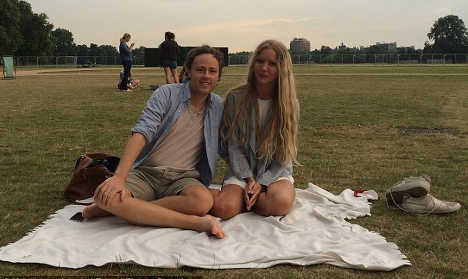ROMANCE
Norway couple find love on word game app
Norwegians are a shy bunch when it comes to romance, so online dating is a godsend. But what to do when even Sukker.no and Tinder let you down? Maria Jernslett, 22, and Erlend Finboe Svendsen, 25, found love competing for high scores on the word game app Ruzzle.
Published: 6 February 2015 12:24 CET

Maria Jernslett, 22, and Erlend Finboe Svendsen, 25, who met on Ruzzle. Photo: Maria Jernslett and Erlend Finboe Svendsen
The couple, who are both based in the UK, began their verbally jousting in 2012 after being put together after selecting the ’random player’ option on the game.
"It wasn’t our intention to find someone on there, not at all," Maria told The Local. "But we liked playing each other because we were almost at the same level. He was really, really good at it and I was good at it as well."
Ruzzle, which combines elements of Boggle and Scrabble, is one of the few wordgame apps to support Norwegian, as it was initially launched in its home Swedish market, as well as in neighbouring Denmark and Norway.
The two mainly played in Norwegian, occasionally testing eachother with a bout in English. With typical Norwegian reserve, it then took Erland two months of playing before he plucked up enough courage to send Maria a message over the app.
"When I finally beat him, he messaged me saying something like 'take it easy'. Then it escalated from there."
Once they started chatting, the two found themselves opening up in a way that neither had before, helped by the anonymity that came from each only knowing the other by their usernames in the game.
"We started chatting about really personal things," Maria said. "We opened up in a way we didn’t with anyone else, because we thought weren't going to meet each other anyway. It ended up that he was the person that knew me best."
They swore that they would never meet in real life, so that they could continue to talk in such an uninhibited and open way.
"We had an arrangement that we weren’t going to meet, but that became impossible after while," Maria admitted. "Suddenly we realised, and we were a little surprised, that we never got tired of one another, even after the conversation had kept going on for almost a year. We could stay up all night chatting about everything from politics to religion to personal things."
While both are based in the UK, they live at opposite ends of the country, with Maria studying psychology at a university in London and Erlend studying an MA at Durham, and the same is true in Norway, with Maria coming from Porsgrunn in the far south, and Erlend from Trondheim.
So it was only when Erlend decided to go to a music festival one summer close to Maria's house that they had a chance to meet. By that time Maria had seen Erlend on Facebook, so it wasn't a blind date.
"It was definitely love at first sight,” Maria explained. I didn’t feel that the way he looked mattered that much because we matched to such an extent that he was attractive to me anyway, but I was glad when I saw him because I think he’s pretty handsome. "We just clicked right away and it was exactly like it was in the game."
The two now plan to get married as soon as Erlend achieves his ambition of securing a job in investment banking.
"We aren’t officially engaged yet, but we are unofficially," Maria says. "It's definitely something that we're going to do."
Url copied to clipboard!


 Please whitelist us to continue reading.
Please whitelist us to continue reading.
Member comments